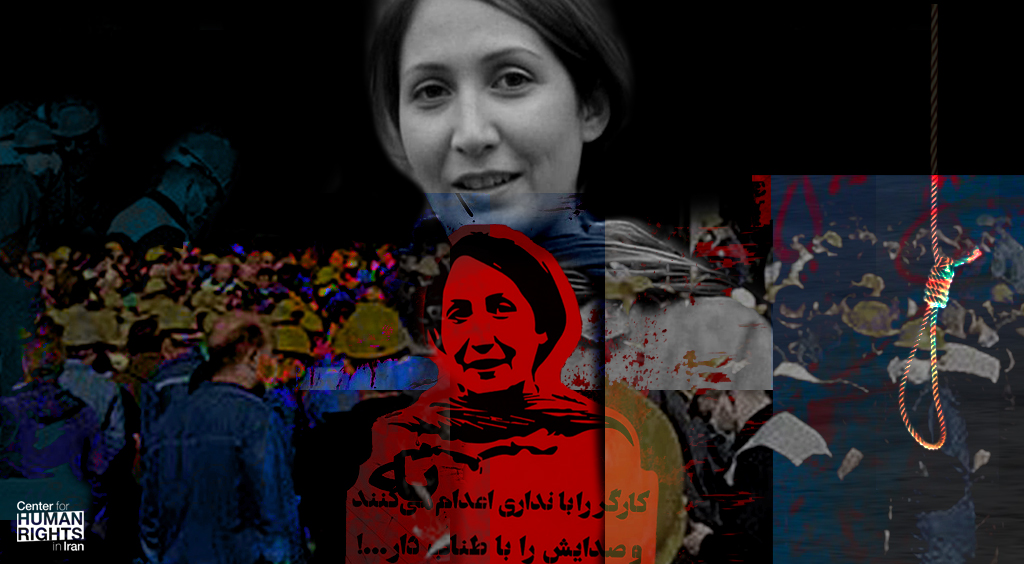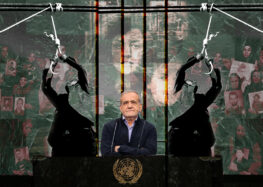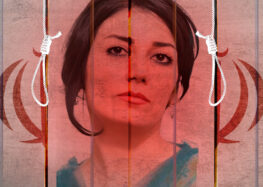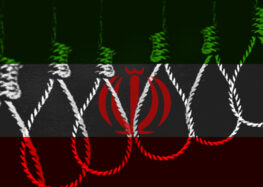Death Sentence for Female Labor Activist Highlights Lethal Repression in Iran

Mother of 12-Year-Old Was Tortured and Held Incommunicado in Solitary
Credible and Corroborated Evidence of Fabricated Charges
July 8, 2024 – The death sentence issued by the Iranian judiciary on the basis of sham charges against Sharifeh Mohammadi, a female industrial engineer and independent labor activist, underscores the intensifying state repression in Iran that is both lethal and unlawful.
Mohammadi received the death sentence on the basis of alleged associations with organizations in which she is not even a member, she said.
“Another woman has been sentenced to death just as Iran’s new president was voted in, indicating that the Islamic Republic has no intention of pausing its state-sanctioned killing machine, which continues to be used to punish and silence peaceful dissent,” said Hadi Ghaemi, executive director of the Center for Human Rights in Iran (CHRI).
“Sharifeh’s case highlights what Iran’s labor activists and indeed any independent member of civil society have been facing for decades: lethal repression for demanding basic rights,” Ghaemi said.
CHRI calls on the international community to demand that the Iranian authorities:
- Immediately dismiss the death sentence against Sharifeh Mohammadi;
- Cease issuing and applying all death sentences, given the systematic violations of basic rights and due process that is routine in Islamic Republic capital punishment cases;
- Adhere to their obligations under Iranian and international law to respect peaceful dissent and independent labor activism.
On July 4, 2024, Branch 1 of the Islamic Revolutionary Court in Rasht, presided over by Judge Ahmad Darvish Goftar, issued a death sentence against Mohammadi, a 45-year-old industrial design engineer and married mother of a 12-year-old son. She had been arrested by agents of the Ministry of the Intelligence in December 2023 and held incommunicado for months, with her family being denied any information about her status or location. The lower court ruling is expected to be appealed by Mohammadi’s lawyer.
Mohammadi’s aunt, Vida Mohammadi, told RFE/RL’s Radio Farda that Sharifeh Mohammadi had been tortured in prison following her arrest on December 5, 2023, and that she had spent several months in solitary confinement.
The Ministry of Intelligence, which is under the authority of Iran’s president, along with the Islamic Revolutionary Guard Corps’ (IRGC) intelligence organization, which reports directly to Supreme Leader Ali Khamenei, both have a long and documented history of collaborating with Iran’s Islamic Revolutionary Court system to use national security-related charges to punish and suppress peaceful dissent.
Mohammadi’s husband, Siros Fathi, was also arrested by the agents of the Ministry of Intelligence, on June 11, 2024, after requesting information about his wife’s case. He was released on bail later that month.
Labor Organization Confirms Mohammadi Is Not Even a Member
The court stated that Mohammadi had been convicted of “armed rebellion against the state.” Evidence presented included her alleged membership in the national Labor Unions Assistance Coordination Committee (LUACC), which operates legally in Iran, and her alleged membership in the banned Komala Party of Iranian Kurdistan.
Mohammadi and her family have vehemently denied her membership in either organization, noting she was never a member of Komala, and has not been a member of LUACC for the past 10 years.
“If membership in the LUACC is an act of rebellion, come and arrest us too, because we were once members of the committee as well,” said Mahmoud Salehi, a former board member of the LUACC, in a post on Instagram on June 28, in which he strongly refuted the charges against Mohammadi.
The Labor Unions Assistance Coordination Committee (LUACC) was established by a group of well-known labor activists in the early 2000s in Iran. Its primary goals included empowering workers by helping them to organize, raising awareness about labor laws and abolishing child labor.
The “Campaign for the Defense of Sharifeh Mohammadi” described the LUACC as legal but said that, in any case, she had not been a member for 10 years.
The campaign called the court verdict against her “medieval and criminal.”
“Many believe that this ridiculous and baseless verdict was issued solely to create an atmosphere of fear and intimidation among Gilan [Province] activists,” the group said.
The Islamic Republic’s violent repression has been particularly pronounced—and deadly—in regions of Iran in which minorities predominate.
Iran is a member of the International Labor Organization, whose Fundamental Principles guarantees the right to independently organize, collectively bargain, and strike.
The country is also a signatory to the International Covenant on Civil and Political Rights (ICCPR), which mandates in Articles 21 and 22 freedom of association and guarantees the right to form trade unions, and to the International Covenant on Economic, Social and Cultural Rights (ICESCR), which guarantees in Article 8 the right of workers to form or join trade unions and protects their right to strike.
Yet peaceful labor rights advocacy is treated as a national security offense, independent labor unions are not recognized, strikers are often fired and risk arrest, and labor leaders are prosecuted under catchall national security charges and sentenced to long prison terms.
The sentence against Mohammadi comes on the heels of three months of escalating state repression against labor rights activists whose demands have largely focused on demanding unpaid or livable wages. During this period, activists have been summoned to court and charged with national security-related offenses. Additionally, those on medical furlough have been forced to return to prison without receiving proper treatment.
“Sharifeh is the latest victim of the Islamic Republic of Iran’s well-oiled system of repression,” said Ghaemi. “The Intelligence Ministry, IRGC, and judicial system each play a dedicated and coordinated role in stamping out any form of peaceful dissent, whether real or imagined, under the guise of corrupt judicial process.”
This report was made possible from donations by readers like you. Help us continue our mission by making a tax-deductible donation.






